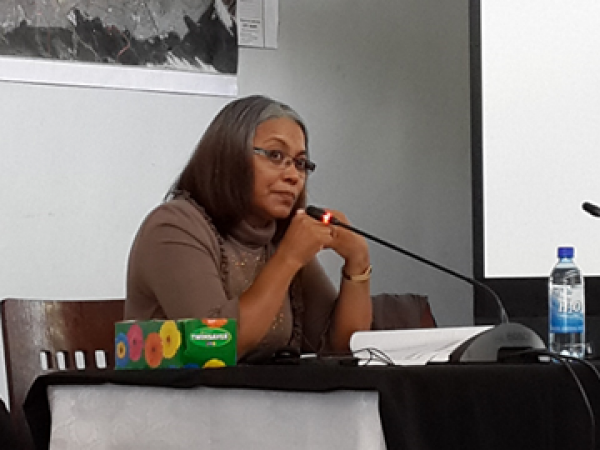Commission hears from emotional cop about systemic failures in investigating rape and murder

On 27 March, the Khayelitsha Commission into policing had a short adjournment to allow an officer time to compose herself after she was overwhelmed with emotion while giving evidence.
Colonel Sonja Harri, the Provincial Head of the Family Violence, Child Protection and Sexual Offences Unit (FCS) broke down on three occasions during her testimony.
Colonel Harri has been responsible for the investigation of a number of disturbing cases: a serial rapist who operated in Khayelitsha, the Anene Booysen case, and various child murder and rape cases.
Harri sounded overwhelmed and under-supported by SAPS. She has to deal with horrific crimes, including the rape and murder of young children. She is also tasked with overseeing the FCS unit and ensuring that their services are of an acceptable standard.
Harri said of child rape: “That child does not have a fighting chance when they are raped by an adult … so I don’t like the fact that we continue to fail them by not investigating it properly”.
In a rigid bureaucratic framework, her role is limited by provincial and national policies, legislation and mandates.
Advocate Lihle Sidaki asked Harri difficult questions about the high number of cases that are withdrawn from court because of dockets not being present.
SAPS has a ‘brought forward’ system which is meant to assist in the re-enrollment of these cases to ensure that they are followed through. However, a large number of cases once withdrawn from court are left un-investigated and are not followed up.
Harri agreed, saying that this does happen.
Adv Ncumisa Mayosi stated on behalf of the complainant organisations that they were appreciative of the difficult work that Harri does and the important work of the FCS. Mayosi went on to say that the nature of her questioning would be forward looking and focussed on finding solutions.
Harri stated that even if the Khayelitsha FCS were granted extras members, as they had requested, it would be insufficient because of the backlog of cases. The Resource Allocation Guide (RAG) provides for 24 officers. Currently they have only 16. What is more, the allocation did not take into account case backlog, only forward-looking demand.
Harri spoke about a negative attitude among members of the FCS. She attributed this to the high workload, and the demoralising and traumatic nature of the work.
They feel “that all the rapes are getting too much… they have become desensitised and are just going through the motions”. Harri said that the team were given a debriefing in November. The FCS offers only two debriefings per year. Harri also stated that some members chose not to attend.
Harri said many officers believe ‘cowboys don’t cry’. Mayosi stated that it seemed that SAPS as a national organisation would need a change in culture and attitude.
Serial rapist – how did they miss it?
Throughout the Khayelitsha Commission, there has been reference to a serial rapist who was active in Khayelitsha in 2011. His activities were first noticed by Dr Genine Josias of the Thutuzela Rape Care Centre.
The Khayelitsha FCS did not pick up on the similarities between various rapes. They missed the evidence that there was a serial offender attacking young children. It took Khayelitsha SAPS more than a year to respond to Dr Josias’s information, during which time a number of young children were brutally raped.
“Yes, they did fail,” admitted Colonel Harri. “We did what we could, as much as was humanly possible … It is just unfortunate that those people had to go through that… and that some of the families were broken because of it”. Harri then broke down.
Harri believes the unit has improved since then, and would not miss such evidence again.
However, Mayosi was unconvinced, citing evidence from a recent inspection report showing problems with the systems in place in the Khayelitsha FCS.
The Khayelitsha FCS is seen as the worst performing of the FCS units in the province. The unit receives fewer dockets than the other FCSs in the province. It is inspected once a year.
Adv Norman Arendse, representing the SAPS, pointed out that the Khayelitsha FCS needs a Crime Intelligence Officer (CIO) responsible for gathering, collating and analysing the crime information gathered by the FCS. Currently there is no one in the Khayelitsha FCS who has the time or technical knowledge to conduct analyses of the crimes and data gathered by the FCS. Colonel Harri agreed, stating that this would be greatly helpful.
Support independent journalism
Donate using Payfast

Next: NEHAWU protests in City
Previous: Senior SAPS members betray personal and institutional prejudices

This article is licensed under a Creative Commons Attribution-NoDerivatives 4.0 International License.
